Diplomatic Bluebook 2020
Chapter 2
Japan's Foreign Policy that Takes a Panoramic Perspective of the World Map
2 Regional Situations in Europe
(1) The European Union (EU)
The EU is a political and economic union consisting of 27 member states with a total population of about 446 million. Sharing fundamental values and principles, the EU is an important partner for Japan in addressing global issues.
<Recent Developments of the EU>
2019 was a year of change for the EU. While the two major parties (the European People's Party (EPP) and the Progressive Alliance of Socialists and Democrats (S&D)) did not secure a combined majority in the European Parliament election held in May, centrist and environmental parties generally increased their seats, which decentralized power in the European Parliament. Due to the election results, the main leadership of the EU underwent changes at the summit level. The new EU leadership was elected at the Special Meeting of the European Council in July, including President of the European Commission von der Leyen and President of the European Council Michel. However, the inauguration of the new European Commission was delayed one month later than planned to December because the European Parliament did not acknowledge some of the European Commission candidates. President of the European Council Michel assumed his position in December as planned.
With regard to Brexit negotiations, which started in June 2017, following three postponements and the UK general election, the UK withdrew from the EU, based on mutual agreement between the UK and the EU at the end of January 2020. The transition period, in which following Brexit the UK still continues to be treated as a member of the EU, began in February 2020. The transition period will last until the end of 2020, during which negotiations are being held toward conclusion of international agreements setting out the new framework for the future relationship between the UK and the EU (the transition period can be extended once for up to two years by mutual consent of the UK and the EU).
On the economic front, amidst high uncertainty around the world, the Eurozone economy had a weak growth rate in 2019 due to deceleration of world trade.
<Japan-EU Relations>
In 2019, Japan-EU relations acquired new legal foundations for cooperation through the entry into force of the Japan-EU EPA in February and the start of the provisional application of the Japan-EU SPA. At the 26th Japan-EU Summit held in April, in addition to the affirmation of cooperation toward the G20 Osaka Summit, the entry into force of the Japan-EU EPA was welcomed with a confirmation of further strengthening the relations for free trade, and cooperation toward implementation of the Japan-EU SPA was confirmed.
At the Europa Connectivity Forum held in September in Brussels, Belgium, Prime Minister Abe and President Juncker of the European Commission gave the keynote speeches, signed a document entitled “The Partnership on Sustainable Connectivity and Quality Infrastructure between Japan and the European Union,” and confirmed connectivity-related cooperation between Japan and the EU.
In addition, with the new EU leaders, Prime Minister Abe had a Japan-EU Summit Telephone Call with President of the European Commission von der Leyen in December immediately following her appointment, and held a meeting with President of the European Council Michel prior to his appointment when he was Prime Minister of Belgium during the UN General Assembly in September. In addition, close dialogues were held with foreign ministers. The G7 Foreign Ministers' Meeting was held in Dinard, France in April, the Japan-ASEAN Ministerial Meeting was held in August, the Ceremony of the Enthronement of His Majesty the Emperor, and the Japan-EU Foreign Ministers' Meeting was held during the Asia-Europe Meeting (ASEM) in December.
On the economic front, the Japan-EU EPA entered into force on February 1, resulting in the birth of a large economic sphere covering about 600 million people and about 30% of the world's GDP. The first meeting of the Japan-EU EPA Joint Committee was held in April in Tokyo. The co-chairs Foreign Minister Kono and Dr. Malmström, European Commissioner for Trade, took stock of the status of implementation of the EPA and discussed future initiatives to further promote trade between Japan and the EU. At the dinner held for the meeting of the Joint Committee, they also discussed the approach to future Japan-EU cooperation based on the EPA, in other words, on the topic of “beyond EPA.” In addition, the first meetings of the specialized committees and working groups covering 12 fields established under the EPA were held in Tokyo and Brussels respectively in succession. Together, with taking stock of the implementation status and sharing matters of interest of both sides toward steady implementation in each field, discussions are conducted on future initiatives between Japan and the EU as well as cooperative systems. Going forward, centered on the EPA Joint Committee, the aims are to show the world policies to handle various issues and further develop Japan-EU economic relations by ensuring steady implementation of the EPA through the specialized committees and by linking the specialized committees and existing Japan-EU dialogue frameworks in a coordinated way.
(2) United Kingdom
With regard to Brexit, as a result of intense debates in the UK House of Commons on the draft Withdrawal Agreement and Political Declaration on the framework for the future relationship agreed upon by the UK and the EU in November 2018, the withdrawal deadline (the end of March 2019) was extended to the end of October 2019. In addition, following increasing pressure against her from inside and outside the government, in May, Prime Minister May announced that she was resigning from her post as Leader of the Conservative Party. She stepped down in June and a party leadership election was held.
Prime Minister Johnson, who assumed his position in July after the party leadership election, negotiated with the EU while aiming to achieve Brexit by the end of October. In October, the UK and the EU agreed on a revised Withdrawal Agreement and Political Declaration. On the other hand, the House of Commons of the UK did not approve the draft Withdrawal Agreement, and passed a bill to require the government to ask the EU for an extension of the withdrawal deadline to the end of January 2020. In the end, the EU agreed to the UK government's request, and the withdrawal deadline was extended to the end of January 2020.
On the other hand, Prime Minister Johnson, who aims to deliver Brexit, sought a general election to ask the will of the nation, and it was held in December 2019. The result was that the Conservative Party led by Prime Minister Johnson secured an overall majority (365 out of 650 seats). After the general election, the UK government submitted a bill to implement the draft Withdrawal Agreement, and it was passed in January 2020. Subsequently, the draft Withdrawal Agreement was approved by the European Parliament, and in the same month, after three years and seven months since the referendum on the UK's membership of the EU (June 2016), Brexit was realized. In regard to the future relationship between the EU and the UK, including economic relations, negotiations will be held during the transition period until the end of 2020, and their results could have a major impact on the world economy as well as Japan's economy.
On the economic front, the situation on the Brexit negotiations between the UK and the EU continues to have impact in the form of uncertainty risks. The economic growth rate from July-September 2019 became low at 1.1% compared with the same quarter a year ago. During the period of August-October 2019, the unemployment rate reached its lowest level of 3.8% since the mid-1970s. The inflation rate in October 2019 fell to the lowest level since November 2016 at 1.5% year-on-year. The policy interest rate was raised to 0.75% in August 2018 and unchanged in 2019.
The UK is strengthening its engagement with the Indo-Pacific region bearing Brexit in mind. Japan and the UK have made progress in policy coordination and exchange at various levels, including the summit and foreign minister levels, and bilateral relations have deepened. Prime Minister Abe visited the UK in January and held a summit meeting with Prime Minister May. The leaders confirmed great development in Japan-UK relations since Prime Minister May's visit to Japan in August 2017 and issued the Japan-UK Joint Statement confirming that they would strengthen cooperation toward achieving a “Free and Open Indo-Pacific” and cooperation toward maintaining and expanding the rules-based, open and free trade system. In addition, Prime Minister Abe held a summit meeting with Prime Minister May when she visited Japan to attend the G20 Osaka Summit in June, and held a summit meeting with Prime Minister Johnson during the G7 Summit in Biarritz in August. In December, Prime Minister Abe had a telephone call with Prime Minister Johnson after his victory in the general election, and reaffirmed that Japan and the UK would advance cooperation toward establishing a new economic partnership between Japan and the UK after the UK's withdrawal from the EU and toward achieving a “Free and Open Indo-Pacific.”
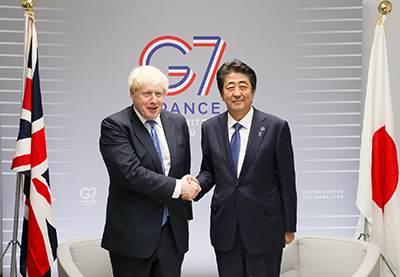 Japan-UK Summit Meeting (August 26, Biarritz, France; Photo: Cabinet Public Relations Office)
Japan-UK Summit Meeting (August 26, Biarritz, France; Photo: Cabinet Public Relations Office)During the ASEAN-related Foreign Ministers' Meetings in August, Foreign Minister Kono held a foreign ministers' meeting with Secretary of State for Foreign and Commonwealth Affairs Raab. In September, Foreign Minister Motegi met with Secretary of State for International Trade Truss, who was visiting Japan, and signed and exchanged letters concerning mutual recognition between Japan and the UK, keeping in mind the UK's withdrawal from the EU.
In the area of security and defense, the British Royal Navy frigate HMS Montrose visited Japan in March, and conducted a Japan-UK-U.S. joint exercise (the sea and airspace in the south of Honshu) with the Maritime Self-Defense Force (MSDF) and the U.S. Navy. In March, through the cooperation between the MSDF supply ship AOE Oumi and the UK Royal Navy frigate HMS Montrose, a highly suspicious case of a ship-to-ship transfer by a North Korean flagged tanker, which is prohibited by UN Security Council resolutions, was confirmed in the high seas of the East China Sea. In October, the survey vessel HMS Enterprise visited Japan and a Japan-UK joint exercise (in the sea in the south of the Kanto area) was conducted. In addition, from September to October, the Vigilant Isles 19 joint exercise was conducted in the UK by the UK Army and the Ground Self-Defense Force. These exercises demonstrated progress in Japan-UK security and defense cooperation in their relationship as the closest security partners in Asia and Europe.
With regard to culture, various events are taking place in Japan and the UK as part of the “Japan-UK Season of Culture 2019-2020,” the period which bridges the two major sports events: the Rugby World Cup 2019 and the Olympic and Paralympic Games Tokyo 2020.
(3) France
Since he took office in May 2017, President Macron has promoted various reforms such as reform of the parliamentary system and reform of the Société Nationale des Chemins de Fer (SNCF), and he has achieved success in improving the unemployment rate and keeping the budget deficit below 3% of the GDP. On the other hand, the government's decision on fuel tax increase in November 2018 brought about large-scale demonstrations known as the “yellow vests movement,” which spread across France as demonstrations appealing for correction of disparities, and led to some extremist riots. To listen to the discontent and requests of the citizens indicated by the “yellow vests movement,” President Macron implemented the “grand débat” to have direct dialogue himself with citizens throughout France from January to March 2019, which resulted in improving his approval rating which had been on a downward trend. On the other hand, in December, labor unions for railroads, teachers, and others opposed the pension system reform proposal, one of President Macron's commitments, and large-scale strikes took place throughout France. With respect to external affairs, France held the G7 Summit in Biarritz in August as the G7 Presidency with the theme of “fight against inequalities.” France continued to raise the banner for multilateralism at various international meetings, and showed leadership for addressing climate change, commerce and trade issues and promoting EU integration, and more.
As for Japan-France bilateral relations, a large-scale project featuring Japanese culture, titled “Japonismes 2018,” was held from July 2018 to February 2019, and was attended by over 3.5 million people. With regard to exchanges among key officials, Foreign Minister Kono visited Brest, France in January and held the fifth Japan-France Foreign and Defense Ministers' Meeting (“2 + 2”) with Minister for Europe and Foreign Affairs Le Drian and others. They agreed to establish the Japan-France Comprehensive Maritime Dialogue and to hold a joint exercise between the French navy aircraft carrier Charles de Gaulle and the MSDF. In May, the Japan-France-US-Australia joint exercise La Perouse was held in the Bay of Bengal. In April, Prime Minister Abe visited France, held a summit meeting with President Macron, and confirmed close cooperation toward resolving various issues faced by the international community as the Chairs of the G20 and the G7 respectively. In June ahead of the G20 Osaka Summit, at the summit meeting between Prime Minister Abe and President Macron, who was paying an Official Visit to Japan, the Roadmap on Japan-France Cooperation for Opening New Horizons between Japan and France under an Exceptional Partnership (2019-2023) was issued, and the leaders agreed to promote concrete cooperation in the Indo-Pacific Region by Japan and France, which are both maritime nations and Indo-Pacific nations. In addition, Prime Minister Abe visited France to attend the G7 Summit in Biarritz in August, and held his third summit meeting with President Macron in the year. In September, the 1st Japan-France Comprehensive Maritime Dialogue was held in Nouméa, New Caledonia, and there were exchanges of views regarding the possibility of future initiatives and cooperation by both countries in maritime governance, the environment, maritime security, the blue economy, and science fields.
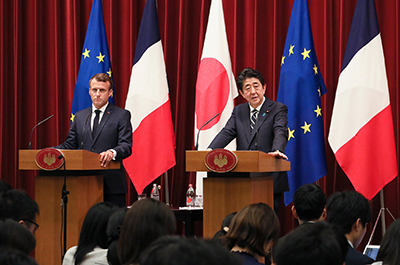 Japan-France Joint Press Conference
Japan-France Joint Press Conference (June 26, Tokyo; Photo: Cabinet Public Relations Office)
(4) Germany
In Germany, beginning with the Bremen state election at the end of May, state elections were held in a total of four states. In these state elections as well as in the European Parliament election held on the same day as the Bremen state election, the approving rates of the two major parties (the federal grand coalition consisting of the Christian Democratic Union and Christian Social Union (CDU/CSU) and the Social Democratic Party (SPD)) have declined. A trend was observed that Alliance 90/The Greens took a great leap in the approving rate in urban areas in former West Germany while Alternative for Germany (AfD) did so in former East Germany.
Due to the resignation of SPD party leader Nahles in early June, the SPD, forming the grand coalition, together with the CDU/CSU underwent an approximately half-year process, and at the party convention in December, Bundestag member Esken and former Finance Minister of North Rhine-Westphalia, Walter-Borjans were elected as co-leaders of the party. As the elected leaders were skeptic of the grand coalition, it was expected at first that the group which supports the withdrawal from the grand coalition would gain power. However, there were strong views calling for restraint on the moves to withdraw from the grand coalition within the SPD party leadership and the Bundestag SPD faction, and the withdrawal was not decided at the party convention. Since the party convention, the SPD approval rating has continued to be low in public opinion polls, and the future of the grand coalition remains uncertain.
With regard to Japan-Germany bilateral relations in 2019, high-level exchanges were held actively, including President Steinmeier's visit to Japan for the Ceremony of the Enthronement of His Majesty the Emperor in addition to three summit meetings and four foreign ministers' meetings. Chancellor Merkel visited Japan in February and held a summit meeting with Prime Minister Abe. In addition to confirming cooperation toward achievement of a “Free and Open Indo-Pacific,” the leaders affirmed strengthening joint research in economic areas on automated driving, artificial intelligence (AI), and the Internet of Things (IoT). In addition, foreign ministers' meetings were held on the sidelines of the multilateral meetings such as the Munich Security Conference (February), the G7 Dinard Foreign Ministers' Meeting (April), and the Stockholm Ministerial Meeting on Nuclear Disarmament and the Non-Proliferation Treaty (NPT) (June). In addition to bilateral relations, there were exchanges of views on international situations such as peace and stability in Africa and the situation in Iran. In November, Federal Minister for Foreign Affairs Maas visited Japan to attend the G20 Aichi-Nagoya Foreign Ministers' Meeting and had his first foreign ministers' meeting with Foreign Minister Motegi.
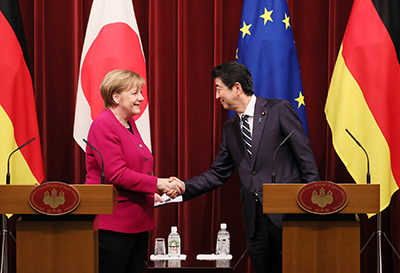 Japan-Germany Summit Meeting (February 4, Tokyo; Photo: Cabinet Public Relations Office)
Japan-Germany Summit Meeting (February 4, Tokyo; Photo: Cabinet Public Relations Office)(5) Italy
The alliance of the ruling coalition party composed of the Five Star Movement and the League was dissolved in August due to internal conflict. However, in September, the Five Star Movement and the Democratic Party formed an alliance and the second Conte Cabinet was inaugurated.
Prime Minister Abe visited Italy in April. In addition to his courtesy call to President Mattarella, he held a summit meeting with Prime Minister Conte, welcomed the entry into force of the Agreement concerning the Transfer of Defense Equipment and Technology, and confirmed strengthening of relations in a wide range of areas. During the meeting, Prime Minister Conte expressed his support for a “Free and Open Indo-Pacific,” and both leaders confirmed cooperation toward forming specific projects together. The same cooperation was confirmed at the foreign ministers' meeting between Foreign Minister Kono and Minister of Foreign Affairs and International Cooperation Moavero Milanesi, who was visiting Japan, in June. There were also other active exchanges among key officials, including the visit to Japan by Prime Minister Conte to attend the G20 Osaka Summit and Foreign Minister Kono's visit to Italy to attend an international meeting in August.
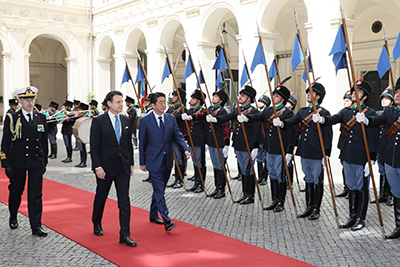 Japan-Italy Summit Meeting (April 24, Rome, Italy; Photo: Cabinet Public Relations Office)
Japan-Italy Summit Meeting (April 24, Rome, Italy; Photo: Cabinet Public Relations Office)(6) Vatican
In November, His Holiness Pope Francis visited Japan (the second papal visit in history since the visit by Pope John Paul II 38 years ago). In addition to the meeting with Prime Minister Abe, he delivered a message toward the realization of “a world without nuclear weapons” in Nagasaki and Hiroshima (see the Column on page 123).
From November 23 to 26, His Holiness Pope Francis visited Japan and toured Tokyo, Nagasaki, and Hiroshima. This visit to Japan was realized in response to invitations from the Government of Japan and the Catholic Bishops' Conference of Japan, and it was only the second time in history that the Pope visited Japan since John Paul II's visit in February 1981.
To an extent that is comparable to Pope John Paul II, who was known as “the pilgrim Pope,” Pope Francis has also been actively travelling around the world and placing great importance on direct communication with the people in each place he visits. This visit to Japan is his 32nd foreign trip since his inauguration in 2013.
Pope Francis commented in newspaper interview in his native Argentina, that it had become difficult to go out casually for a pizza since he became Pope. When the reporter suggested that he ordered a pizza to be delivered to the Vatican, he responded that he preferred going to eat in a pizzeria than having a takeout, and that the important thing was to go there in person. This comment provides insight on and accurately represents Pope Francis' personality.
Despite his age, 82-year old Pope Francis completed his itinerary energetically and tirelessly. After arriving in Tokyo from Thailand, which he was visiting before Japan, in the evening of November 23, he departed from Tokyo early the next morning for day visits to Nagasaki and Hiroshima. Pope Francis with a great desire for international peace, delivered a truly powerful message toward the realization of “a world without nuclear weapons,” amid the pouring rain at the Nagasaki Peace Park and at the Hiroshima Peace Memorial Park. This message was covered in reports not only in Japan but around the world, highlighting the strong interest he had raised.
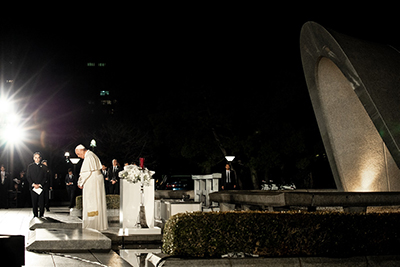 Hiroshima Peace Memorial Park (Photo: Hiroshima Prefecture)
Hiroshima Peace Memorial Park (Photo: Hiroshima Prefecture)During his stay in Tokyo on November 25, Pope Francis had an audience with His Majesty the Emperor and met with Prime Minister Abe. In his speech at the Meeting with Authorities and the Diplomatic Corps (at the Prime Minister's Office), Pope Francis touched on the friendly relations between Japan and the Vatican, and said that he was impressed by the religious and ethical values that characterize Japan's cultural heritage and traditional culture. In addition, at the large-scale Mass held at Tokyo Dome on the same day, he interacted with approximately 50,000 Catholic adherents and Japanese people who had been eagerly waiting for his visit to Japan, and spoke about the importance of compassion for others.
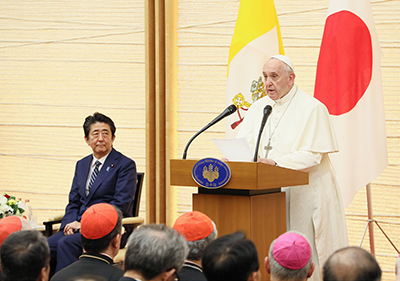 “Meeting with Authorities and the Diplomatic Corps” (Photo: Cabinet Public Relations Office)
“Meeting with Authorities and the Diplomatic Corps” (Photo: Cabinet Public Relations Office)When he departed from Japan, Pope Francis commented in the Japanese language on his personal Twitter account, which has more than 18 million followers, that he was deeply grateful to the people of Japan. This gesture made Japanese people feel even closer to him. 2019 marked the 100th anniversary of the appointment of the first delegate of the Roman Curia to Japan. Taking this opportunity of the Pope's visit to Japan, we anticipate greater development in Japan-Vatican relations.
(7) Spain
Although the Spanish Socialist Workers' Party (PSOE) became the leading party in the parliamentary election in April, it did not secure a majority, and acting Prime Minister Sanchez did not gain the confidence. Following the agreement to form a coalition between PSOE, which had maintained its status as top party in the second parliamentary election in November, and the radical left-wing Unidas Podemos, Prime Minister Sanchez was reappointed in January 2020 and formed the first political coalition government after Spain's democratization.
Prime Minister Sanchez visited Japan to attend the G20 Osaka Summit in June, and shared the view with Prime Minister Abe to work closely in the G20. In October, Prime Minister Abe met with His Majesty King Felipe VI of Spain, who visited Japan for the Ceremony of the Enthronement of His Majesty the Emperor. Foreign Minister Motegi held a foreign ministers' meeting with Minister of Foreign Affairs Borrell, who had accompanied His Majesty King Felipe VI, and they shared the view on strengthening their relations in a variety of areas including corporate cooperation and people-to-people exchanges. In November, the 21st Japan-Spain Symposium was held in Castellón, Valencia themed on “society 5.0: a human-centered technology society,” for the purpose of promoting mutual understanding between both countries and strengthening cooperative relations. During the symposium, candid exchanges of views were held based on the perspectives of both the government and the private sector.
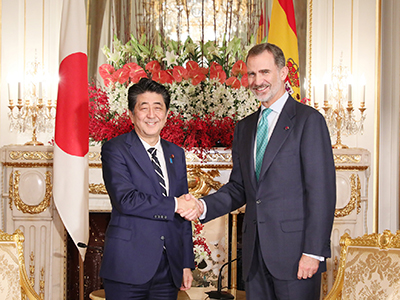 Meeting between Prime Minister Abe and His Majesty King Felipe VI of Spain
Meeting between Prime Minister Abe and His Majesty King Felipe VI of Spain (October 21, Tokyo; Photo: Cabinet Public Relations Office)
(8) Ukraine
After the primary vote of the presidential election held in March following the end of the term of President Poroshenko resulted in candidates Zelenskyy (30.24%) and Poroshenko (15.95%) as the top two candidates, the final ballot was held in April. Candidate Zelenskyy (73.22%) won against candidate Poreshenko (24.45%), and took office as the new President on May 20. President Zelenskyy announced the dissolution of the Ukrainian Parliament immediately following his inauguration as President. In the parliamentary election that was brought up to be held in July, the Servant of the People Party led by President Zelenskyy secured a majority of seats to become the sole ruling party. The new Honcharuk government was formed through the new parliament in August.
President Zelenskyy announced his stance for dialogue with Russia to break the ongoing unstable deadlock accompanying the lack of a ceasefire in eastern Ukraine. Following multiple telephone summit calls with President Putin, in September, there was an exchange of 35 detainees each held by both Ukraine and Russia, including 24 people detained near the Kerch Strait in November 2018. Resolution efforts are being conducted toward implementation of the Minsk Agreements, including agreement on the “Steinmeier Formula” in October that prescribes the sequence of holding local elections and the entry into force of laws on special order in the occupied territories in eastern Ukraine. The Normandy Format (France, Germany, Russia, and Ukraine) summit meeting was held for the first time in about three years in December. Together, with agreeing to a complete ceasefire within the year, it was decided to continue coordination toward holding another summit meeting four months later.
With regard to bilateral relations with Japan, Parliamentary Vice-Minister for Foreign Affairs Yamada Kenji attended the Ukraine Reform Conference held in July in Toronto, Canada. He announced Japan's continued support for efforts toward internal reform of Ukraine's new administration. Prime Minister Abe held a summit meeting with President Zelenskyy when he visited Japan to attend the Ceremony of the Enthronement of His Majesty the Emperor in October, and they had an exchange of views regarding matters such as the situation in Ukraine and future support for Ukraine.
Other European Regions
[Nordic countries]
Denmark: After the general election in June, Leader of the Social Democr atic Party Frederiksen was inaugurated as the youngest Prime Minister (41 years old) in the history of the constitutional government of Denmark, and established her new administration. In August, the general election was held in the Faroe Islands, and the new administration led by the leader of the Union Party Nielsen was established.
Finland: 2019 marked the 100th anniversary of the establishment of Japan-Finland diplomatic relations, and various commemorative events were held in both countries (see the Special Feature on page 128). In September, the Agreement between Japan and the Republic of Finland on Social Security was signed. In October, Prime Minister Abe held a meeting with President Niinistö, who was visiting Japan to attend the Ceremony of the Enthronement of His Majesty the Emperor. Both leaders confirmed to further develop bilateral relations taking the opportunity of the 100th anniversary, as w ell as promoting cooperation in a wide range of areas based on the Strategic Partnership.
Norway: Foreign Minister Motegi held a meeting with Foreign Minister Søreide during the ASEM Foreign Ministers' Meeting in December and expressed a desire to further strengthen cooperation in the field of whaling. Both ministers confirmed to promote further cooperation in areas such as the Arctic and whaling.
Sweden: In April, the Agreement between Japan and the Kingdom of Swed en on Social Security was signed. In June, Foreign Minister Kono held a meeting with Foreign Minister Wallström during his visit to Sweden, and both ministers agreed to continue to cooperate in a wide range of areas based on the 150th anniversary of the est ablishment of diplomatic relations in 2018. In December, Foreign Minister Motegi held a meeting with Foreign Minister Linde during the ASEM Foreign Ministers' Meeting, and both ministers expressed their expectations for further developing bilateral relations including economic relations.
Iceland: In October, Prime Minister Abe held a meeting with President Jóhannesson, who was visiting Japan to attend the Ceremony of the Enthronement of His Majesty the Emperor, and welcomed progress of bilateral cooperation in a wide range of areas such as the Arctic.
[Benelux countries]
The Netherlands: In January, Prime Minister Abe visited the Netherlands, and d uring his summit meeting with Prime Minister Rutte, they confirmed cooperation at the G20 Osaka Summit as well as strengt hening cooperation based on the Strategic Partnership for Sustainable Peace and Prosperity. In June, Prime Minister Rutte visited Japan and attended the G20 Osaka Summit. In November, Foreign Minister Motegi held a foreign ministers' meeting with Foreign Minister Blok, who was visiting Japan to attend the G20 Aichi-Nagoya Foreign Ministers' Meeting, and welcomed the prospect of introducing a Working Holiday Program, and confirmed close cooperation in a wide range of areas.
Belgium: In October, Prime Minister Abe held a meeting with His Majest y King Philippe, King of the Belgians, who was visiting Japan to attend the Ceremony of the Enthronement of His Majesty the Emperor. Prime Minister Abe stated that he would like to develop bilateral relations in a wide range of areas based on the good relat ionship between the Imperial Household and the Royal Household, and King Philippe stated his hopes for continued development of bilateral relations.
Luxembourg: In October, Prime Minister Abe held a meeting with His Royal Highness Grand Duke Henri of Luxembourg, who was visiting Japan to attend the Ceremony of the Enthronement of His Majesty the Emperor. Prime Minister Abe stated that he would like to develop bilateral relations in various fields, such as politics, economy, culture and people-to-people exchanges, and both confirmed cooperation toward the success of the Olympic and Paralympic Games Tokyo 2020.
Monaco: In October, Prime Minister Abe held a meeting with His Serene Highness Albert II, Sovereign Prince of Monaco, who was visiting Japan to attend the Ceremony of the Enthronement of His Majesty the Emperor and to attend the Rugby World Cup 2019, They exchanged views regarding favorable bilateral relations includi ng cultural exchanges and initiatives for tackling the issue of marine plastic litter.
Andorra: In October, Foreign Minister Motegi held the first-ever Japan- Andorra Foreign Ministers' Meeting with Foreign Minister Ubach Font, who was visiting Japan to attend the Ceremony of the Enthronement of His Majesty the Emperor. They agreed to aim for strengthening relations toward expanding exchanges in a wide range of fields such as tourism.
Portugal: The Assembly of the Republic election was held in October, an d the second administration under Prime Minister Costa of the Socialist Party was inaugurated in the same month. 2020 marks the 160th anniversary of the Treaty of Peace, Amity and Commerce between Japan and Portugal.
San Marino: In December, the general election for the Grand and General Council was held, and in January 2020 the new governmentled by Minister of Foreign Affairs, International Economic Cooperation and Telecommunications Beccari was inaugurated.
Malta: Parliamentary exchanges were activated due to the establishment of the Parliamentary Friendship Group in both countries in 2018 and 2019. There was an official visit to Malta by the Parliamentary Union of Japanese-Maltese Friendship in 2019, and a courtesy call to President Vella.
[Baltic countries]
The 2nd Japan-Baltic Cooperation Dialogue, which was establishe d during Prime Minister Abe's visit to the three Baltic countries in January 2018, was held in September 2019 in Latvia. The views regarding matters such as strengthening connectivity leveraging advanced technologies and regional affairs were exchanged, and strengthening of cooperative relations between Japan and the Baltic countries was confirmed.
Latvia: In February, Foreign Minister Kono held a meeting with Foreign Minister Rinkēvičs during the Munich Security Conference, and confirmed to promote cooperation between Japan and the Baltic count ries through the Japan-Baltic Cooperation Dialogue. In October, Prime Minister Abe held a meeting with President Levits, who wa s visiting Japan to attend the Ceremony of the Enthronement of His Majesty the Emperor, and they confirmed strengthening economic relations between both countries.
Lithuania: In October, Prime Minister Abe held a meeting with President Nausėda, who was visiting Japan to attend the Ceremony of the Enthronement of His Majesty the Emperor. Prime Minister Abe stated that he would like to cooperate to propagate the common values and the bond between Japan and Lithuania using the opportunity of 2020, the 80th anniversary of Mr. Sugihara Chiune's issuing of the “Visas for Life.” Both leaders confirmed to further strengthen bilateral relations and to closely collaborate each other in addressing the challenges of the international community.
Estonia: In October, Prime Minister Abe held a meeting with President Kaljulaid, who was visiting Japan to attend the Ceremony of the Enthronement of His Majesty the Emperor. They confirmed on furth er development such as on cooperation through the Japan-Baltic Cooperation Dialogue and public-private cooperation in IT and cyber areas.
Ireland: In October, Prime Minister Abe received a courtesy call from Mr. O'Donovan, Cathaoirleach of Seanad Éireann (Speaker of the Upper House of Ireland), who was visiting Japan to attend the Ceremony of the Enthronement of His Majesty the Emperor. He praised the playing of both countries' teams during the Rugby World Cup 2019, and held an exchange of views regarding bilateral relations. In December, Foreign Minister Motegi held a foreign ministers' meeting with Tánaiste and Minister for Foreign Affairs and Trade Coveney during the ASEM Foreign Ministers' Meeting, and confirmed strengthening bilateral relations in a wide range of fields focused on Brexit as well as strengthening cooperation in the international arena.
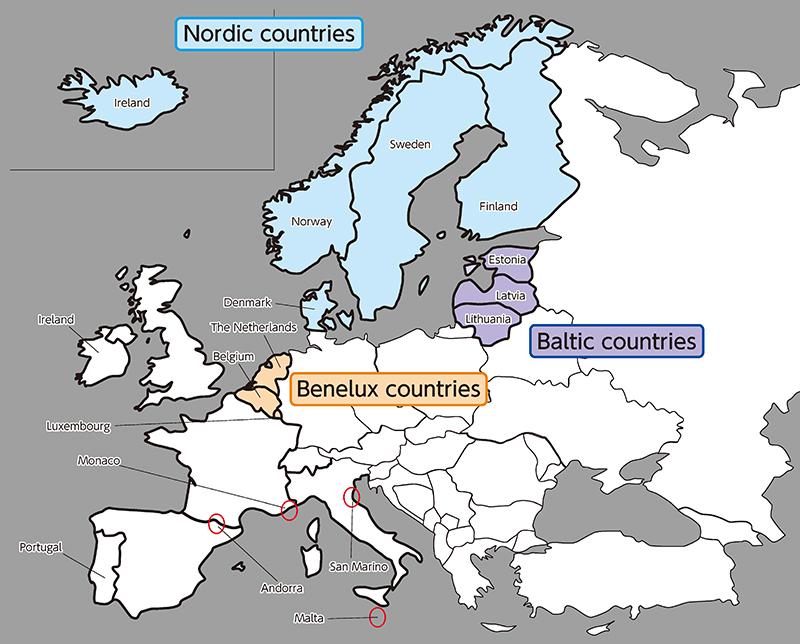
【V4】
Japan places emphasis on its cooperative relationship with the Visegrád Four (V4), a regional cooperative framework comprising the four countries of Poland, the Czech Republic, Slovakia, and Hungary, which are increasing their presence in Europe against the backdrop of steady economic growth. Japan-V4 cooperation was further strengthened by implementing the “V4+Japan” Seminar Regarding the Global Economy and Free Trade in April and holding the Third “Visegrad Group plus Japan” Summit Meeting during Prime Minister Abe's visit to Slovakia, continuing on from the previous year.
Poland: 2019 was the 100th anniversary of the establishment of diplomatic relations between Japan and Poland (see the Special Feature on page 128). In April, Prime Minister Abe held a Summit Meeting with Prime Minister Morawiecki in Slovakia. The parliamentary election was held in October, and the new cabinet was inaugurated under Prime Minister Morawiecki, who was reelected.
Slovakia: In April, Prime Minister Abe paid the first ever visit to Slovakia by a Prime Minister of Japan. He held the Third “Visegrad Group plus Japan” Summit Meeting and a Japan-Slovakia Summit Meeting in Bratislava. In September, Minister of Foreign and European Affairs Lajčák visited Japan, and Foreign Minister Kono held a Foreign Ministers' Meeting with him. Political dialogue was activated, including the visit to Japan by President Čaputová for the Ceremony of the Enthronement of His Majesty the Emperor, Prime Minister Abe holding a Summit Meeting, and their agreement to strengthen cooperation toward the 100th anniversary of Japan-Slovakia exchanges in 2020.
Czech Republic: The Czech Republic assumed the V4 presidency from July. In 2019 there were two Summit Meetings between Prime Minister Abe and Prime Minister Babis: during the visit to Slovakia by Prime Minister Abe in April and the visit to Japan by Prime Minister Babis for the Ceremony of the Enthronement of His Majesty the Emperor. The leaders agreed to activate bilateral exchanges toward the 100th anniversary of Japan-Czech Republic exchanges in 2020. In Dece mber, Foreign Minister Motegi held a meeting with Foreign Minister Petříček during the ASEM Foreign Ministers' Meeting, and confirmed strengthening of bilateral relations and promotion of “V4+Japan” cooperation.
Hungary: 2019 was the 150th anniversary of the establishment of Japan-Hungary diplomatic relations (see the Special Feature on page 129). A Foreign Ministers' Meeting was held during the visit to Japan by Minister of Foreign Affairs and Trade Szijjártó in November, and Prime Minister Orbán visited Japan in December. During the Summit Meeting, there was confirmation of further strengthening bilateral cooperation as well as the continuation and strengthening of “V4+Japan” cooperation.
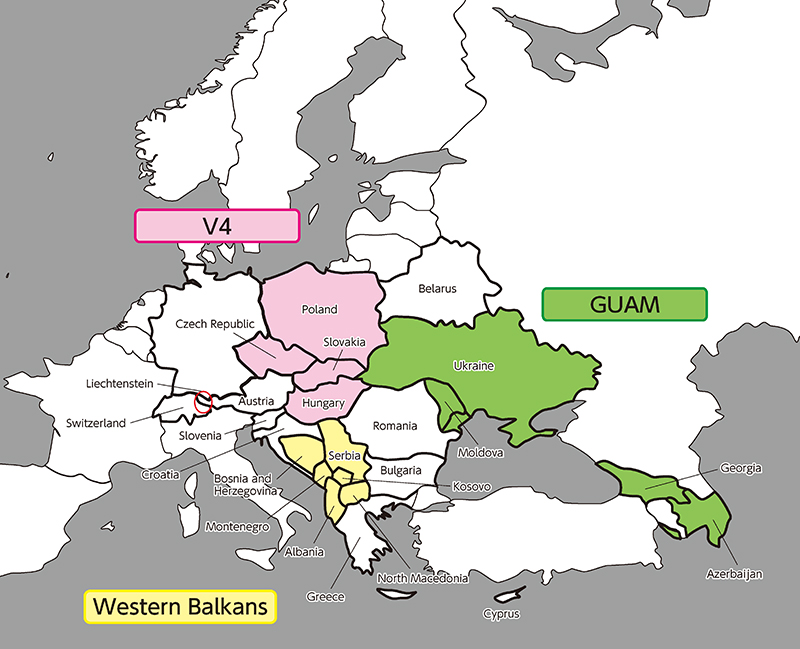
[The Western Balkans]
Although there still remains ethnic divisiveness, overall progress can be seen for stability and development in the Western Balkan region owing to each country's commitment to reforms toward European integration. Prime Minister Abe visited Serbia in January 2018, the first visit ever by a Japanese Prime Minister. During the visit, he announced the Western Balkans Cooperation Initiative designed to advance cooperation with the Western Balkans (Albania, Kosovo, Serbia, Bosnia-Herzegovina, North Macedonia, and Montenegro), which aims for EU membership. Japan has promoted c ooperation with the entire Western Balkan region in areas such as youth and economic exchanges. In terms of relations with Japan, Foreign Minister Kono visited Serbia in August and President Thaci of Kosovo visited Japan in September. Furthermore, in October, Prime Minister Abe held meetings respectively with President Meta of Albania, President Thaci of Kosovo, President Đukanović of Montenegro, and Prime Minister Brnabić of Serbia during their visits to Japan to attend the Ceremony of the Enthronement of His Majesty the Emperor. He confirmed strengthening of bilateral relations with each country and support under the Western Balkans Cooperation Initiative.
[GUAM (Georgia, Ukraine, Azerbaijan, Moldova)]
A workshop with the theme of “promotion of investment” was held in Tokyo in March. In December, Parliamentary Vice-Minister for Foreign Affairs Nakatani met with Secretary General of GUAM Efendiev in Bratislava, Slovakia, and issued the “GUAM+Japan” Joint Press Release due to Japan' s cooperation with GUAM thus far.
Belarus: There were mutual visits between Japan and Belarus including the visit to Belarus by Special Advisor to the Prime Minister Sonoura Kentaro and Minister for Reconstruction Watanabe Hiromichi in June, and the visit to Japan by Minister of Emergency Situations Vashchenko in December.
Slovenia: In August, Foreign Minister Kono paid the visit to Slovenia b y a Japanese Foreign Minister, and held a meeting with Foreign Minister Cerar and paid a courtesy call to President Pahor. In October, President Pahor visited Japan for the first time in six years to attend the Ceremony of the Enthronement of His Maj esty the Emperor. Prime Minister Abe met with him, and they agreed to expand government and economic relations as well as bilateral relations in science and technology areas.
Romania: There were meetings at the summit level during the visit to Japan by President Iohannis in October, and at the foreign minister level during the ASEM Foreign Ministers' Meeting in De cember, during which the both countries agreed to strengthen cooperation toward the 100th anniversary of the establishment of diplomatic relations in 2021.
Bulgaria: In 2019, the year of “triple anniversary” - the 110th anniversary of the beginning of bilateral contacts, the 80th anniversary of the establishment of diplomatic relations, and the 60th anni versary of the resumption of diplomatic relations ‒ Foreign Ministers' Meetings were held during the visit to Japan by Depu ty Prime Minister for Judicial Reform and Minister of Foreign Affairs Zaharieva in March, and the visit to Bulgaria by Foreign Minister Kono in August. Furthermore, President Radev visited Japan in October and Prime Minister Abe held a meeting with him. They confirmed strengthening of economic relations as well as cooperation under the Western Balkans Cooperation Initiative.
Croatia: Minister of Foreign and European Affairs Pejčinović Burić visited Japan in March, and Speaker of the Croatian Parliament Jandroković visited Japan in June. In addition, in August, Fore ign Minister Kono paid the first visit to Croatia by a Japanese Foreign Minister in 24 years. He held a meeting with Minister o f Foreign and European Affairs Grlić Radman, and confirmed strengthening cooperation with Croatia, the bridge between the EU and the Western Balkans.
Austria: 2019 was the 150th anniversary of friendship between Japan-Austria (see the Special Feature on page 129). In February, Chancellor Kurz visited Japan and Prime Minister Abe held a Summit Meeting with him. In March, Minister for Europe,Integration and Foreign Affairs Kneissl visited Japan to attend the 5th World Assembly for Women (WAW!), and met with State Minister for Foreign Affairs Abe Toshiko. In May, Parliament passed a vote of no confidence due to the scandal concerning Vice-Chancellor and the leader of the Freedom Party of Austria Strache, and an interim administration was established under the new Chancellor Bierlein. At the end of September, the National Council election was held and the Austrian People's Party led by the leader Kurz emerged victorious.
Liechtenstein: H.S.H. Hereditary Prince Alois visited Japan to attend the Ceremony of the Enthronement of His Majesty the Emperor in October.
Switzerland: In June, President and Head of the Federal Department of Finance Maurer visited Japan and Prime Minister Abe held a Summit Meeting with him. In addition, in July, Federal Counci llor and Head of the Federal Department of Economic Affairs, Education and Research Parmelin visited Japan, and Parliamentary Vice-Minister for Foreign Affairs Tsuji Kiyoto held an exchange of views with him.
Greece: In addition to the visit to Greece by Special Advisor to the Prime Minister Sonoura in June, Foreign Minister Kono held a Foreign Ministers' Meeting with Foreign Minister Katrougalos during his visit to Japan in June. In the general election held in July, the single-party administration led by Prime Minister Mitsotakis of the New Democracy (ND) party was inaugurated.
Cyprus: Continuing on from the opening of the Embassy of Japan in Cyprus in January 2018, the Embassy of Cyprus in Tokyo was opened. There are expectations for further strengthening of relations toward the 60th anniversary of the establishment of diplomatic relations in 2020.
Poland is one of the friendliest European countries to Japan. It has overcome a history of suffering and hardship, with its territory partitioned in the 18th century and disappearing from the world map at one point. In 1918 after the end of World War I, it regained its independence for the first time in 123 years. In March 1919, Japan became the first country in Asia to recognize the government of the Republic of Poland and establish diplomatic relations with the country.
Another country that established diplomatic relations with Japan at around the same time, in May 1919, was Finland, which had gained independence from Russia in 1917. Finland may appear to be located far away from Japan on a map, but today thanks to direct flights departing from five Japanese airports (as of December 2019) to Helsinki, its capital, Finland is the closest part of Europe for Japan as it is reachable in the shortest time. Moreover, Finland has been familiar to the Japanese people because of ‘Moomin' and ‘Santa Claus.'
Visit by Their Imperial Highnesses Crown Prince and Crown Princess Akishino
In 2019, which marked the centenary of diplomatic relations between Japan and Poland and Finland respectively, various commemorative events were held throughout the year. Among those events, the visit by Their Imperial Highnesses Crown Prince and Crown Princess Akishino to the two countries (from June 27 to July 6) became a symbol of the longtime friendship that Japan has shared with the two countries.
Their Imperial Highnesses were warmly welcomed by President Duda and his wife in Poland, and by President Niinistö and his wife in Finland. In addition to deepening friendly ties through courtesy calls and luncheons, Their Imperial Highnesses also visited institutions and facilities that have close relationships with Japan as well as many places that are representative of the culture and history of each country. For example, Their Imperial Highnesses visited, in Poland, the Manggha Museum of Japanese Art and Technology (commonly known as the “Manggha Museum”), and in Finland a “neuvola” (meaning “a place for advice” in Finnish), which is a childcare support facility that is unique to the country. During these visits, Their Imperial Highnesses exchanged opinions with professionals and experts from the respective fields. In addition, at each place, Their Imperial Highnesses had heartwarming interactions with citizens and children who were there to welcome them.
The visit to Poland and Finland by Their Imperial Highnesses Crown Prince and Crown Princess Akishino served to reaffirm the friendship and the goodwill that have long existed between Japan and the two countries. At the same time, it also further deepened the bonds of friendship with the countries toward the next centenary, and brought forth a sense of anticipation for a bright future.
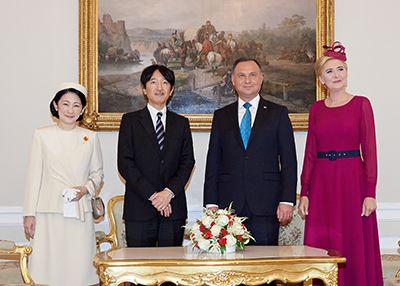 Their Imperial Highnesses Crown Prince and Crown Princess Akishino paying a courtesy call on President Duda and the First Lady of Poland (June 28, Warsaw, Poland; Photo: Imperial Household Agency)
Their Imperial Highnesses Crown Prince and Crown Princess Akishino paying a courtesy call on President Duda and the First Lady of Poland (June 28, Warsaw, Poland; Photo: Imperial Household Agency)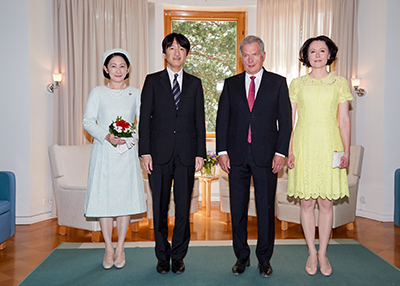 Their Imperial Highnesses Crown Prince and Crown Princess Akishino paying a courtesy call on President Niinistö and the First Lady of Finland (July 3, Helsinki, Finland; Photo: Imperial Household Agency)
Their Imperial Highnesses Crown Prince and Crown Princess Akishino paying a courtesy call on President Niinistö and the First Lady of Finland (July 3, Helsinki, Finland; Photo: Imperial Household Agency)Port of Humanity Tsuruga Museum
In 2020, Poland and Japan celebrate the centenary of another important event. Amidst the chaos of the Russian Revolution, it was the Government of Japan and the Japanese Red Cross Society that rescued Polish orphans suffering from starvation and infectious diseases in Siberia. The 763 orphans who arrived at Tsuruga Port in Fukui Prefecture between 1920 and 1922 were provided with medical treatment in Tokyo and Osaka before returning to their home country. Tsuruga Port not only welcomed the Polish orphans; it was also the very place where Jewish refugees who had escaped from Nazi Germany's persecution landed in the 1940s. In autumn 2020, the Port of Humanity Tsuruga Museum, an archival museum in Tsuruga City that holds and provides information about these events, will be reopened after renovations are completed. The Museum will introduce the history of how Tsuruga Port welcomed many people during turbulent times, to people in Japan and abroad.
Building on the basis of trust and friendship spanning a century, Japan is beginning to carve out a new chapter in its history of friendly relations with Poland and Finland as it moves toward the next centenary. We look forward to further deepening mutual understanding with the two countries even beyond 2020.
2019 was a milestone year that marked 150 years since Japan concluded the “Treaty of Amity and Commerce” with Austria-Hungary (1869). In the 150 years henceforth, Japan has established a close relationship with the two countries politically and economically, as well as in a wide range of other fields including academia, culture, and sports. In 2019, various exchange events were held in Japan as well as in Austria and Hungary, and mutual understanding between their citizens was enhanced.
In this monumental year marking 150 years of friendship between Japan and Austria, and 150 years since the establishment of diplomatic relations between Japan and Hungary, Her Imperial Highness Princess Kako of Akishino made her first official overseas visit to both countries from September 15 to 25.
Her Imperial Highness was greeted by President Alexander Van der Bellen, Chancellor Brigitte Bierlein, as well as key government officials of Austria. Reflecting on the 150 years of history between the two countries, Her Imperial Highness affirmed the importance of further developing the favorable bilateral relations. Her Imperial Highness also attended such events as the 150th anniversary reception and the commemorative ceremony for the restoration of the Japanese Garden at Schönbrunn Palace. In addition, Her Imperial Highness met with people from all walks who have been instrumental in developing the bilateral relations, and expressed her respect for their contributions to date.
In Hungary, Her Imperial Highness was welcomed by President Áder and his wife, Speaker of the National Assembly Kövér, as well as members of the Hungarian-Japanese Friendship Group of the Hungarian National Assembly. In addition to the capital Budapest, Her Imperial Highness also visited Pannonhalma, Bábolna, Herend, and Tihany, among other places, and interacted with people. At the 150th anniversary dinner banquet, Her Imperial Highness had the opportunity to meet with holders of Japanese orders, and recipients of the Foreign Minister's Commendations. To commemorate the 150th anniversary, the main tower of Elizabeth Bridge, which spans the Danube River, was lit up with the flags of Japan and Hungary. Her Imperial Highness, together with the Mayor of Budapest and his wife, were deeply moved by the history of the bilateral relations that has been woven by the many people who have gone before us.
Her Imperial Highness' visit to Austria and Hungary looked back on the path of friendship built over many years by the peoples of Japan, Austria, and Hungary, linked the history of that friendship to the future, and affirmed the further strengthening of friendly relations between Japan and the two countries.
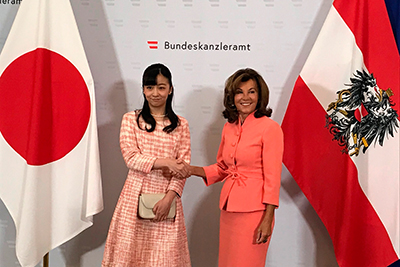 Commemorative photograph with Chancellor Bierlein at the Federal Chancellery of Austria (September 18, Vienna, Austria)
Commemorative photograph with Chancellor Bierlein at the Federal Chancellery of Austria (September 18, Vienna, Austria)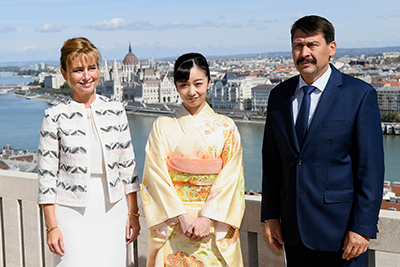 Her Imperial Highness Princess Kako of Akishino paying a courtesy call on President Áder and the First Lady of Hungary (September 20, Budapest, Hungary; Photo: The President's Office, Hungary)
Her Imperial Highness Princess Kako of Akishino paying a courtesy call on President Áder and the First Lady of Hungary (September 20, Budapest, Hungary; Photo: The President's Office, Hungary)


